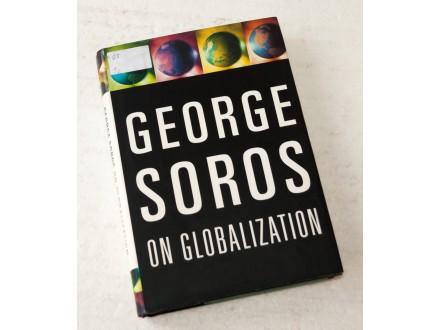George Soros On Globalization
Stara cena |
800 din |
|
| Cena: | ||
| Želi ovaj predmet: | 3 |
| Stanje: | Polovan bez oštećenja |
| Garancija: | Ne |
| Isporuka: | Pošta Post Express Lično preuzimanje |
| Plaćanje: | Tekući račun (pre slanja) Lično |
| Grad: |
Beograd-Zemun, Beograd-Zemun |
ISBN: Ostalo
Godina izdanja: 2002
Jezik: Engleski
Autor: Strani
Autor: George Soros
Izdavač: PublicAffairs, 2002.
Tvrd povez, 192 str.
Težina: 351 gr
podvlačeno na pojedinim mestima
Over the past decade, `globalization` has become a buzzword for everything that is happening in the world economy or even in international relations generally. But as even a cursory glance at recent headlines reveals, not everyone is happy with globalization. Violent protests are now a regular feature of international summit meetings, and many young people have expressed their strong opposition to policies that they see as enriching the rich at the expense of workers, the environment, and traditional culture. As the world economy has transformed in the 1990s and early 2000s, no individual has grappled with the social and political implications of globalization more than George Soros. George Soros on Globalization seeks to assess not merely how well the world`s financial institutions have fulfilled their larger mission of helping the entire world strive for prosperity, but also to point the way toward fixing the problems that have emerged in the globalization regime as a whole. Unlike other proponents of globalization, Soros does not dismiss the criticisms of the protesters; indeed, he welcomes them and acknowledges that in many ways the protesters have a clearer view of the issues at stake than the bankers and bureaucrats do. We ignore the protesters` message, Soros warns, at our peril.
Whether it manifests itself as free trade, the Internet, or rescue missions for foundering economies, the fact remains that the world is linked together today in a fashion that was inconceivable during the Cold War, but not everyone is happy with globalization. Violent protests are now a regular feature of international summit meetings, and many young people have expressed their opposition to policies that they see as enriching the rich at the expense of workers, the environment, and traditional culture.
48
PLAĆANJE POUZEĆEM NIJE MOGUĆE
POGLEDAJTE I OSTALE KNJIGE KOJE PRODAJEM
KLIKNITE NA LINK
https://www.kupindo.com/pretraga.php?Prodavac=madena&Grupa=1
Predmet: 45958841







